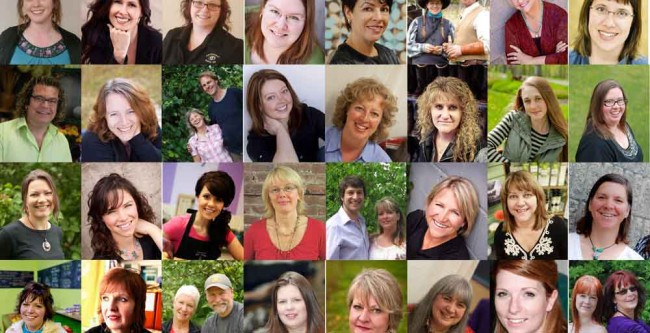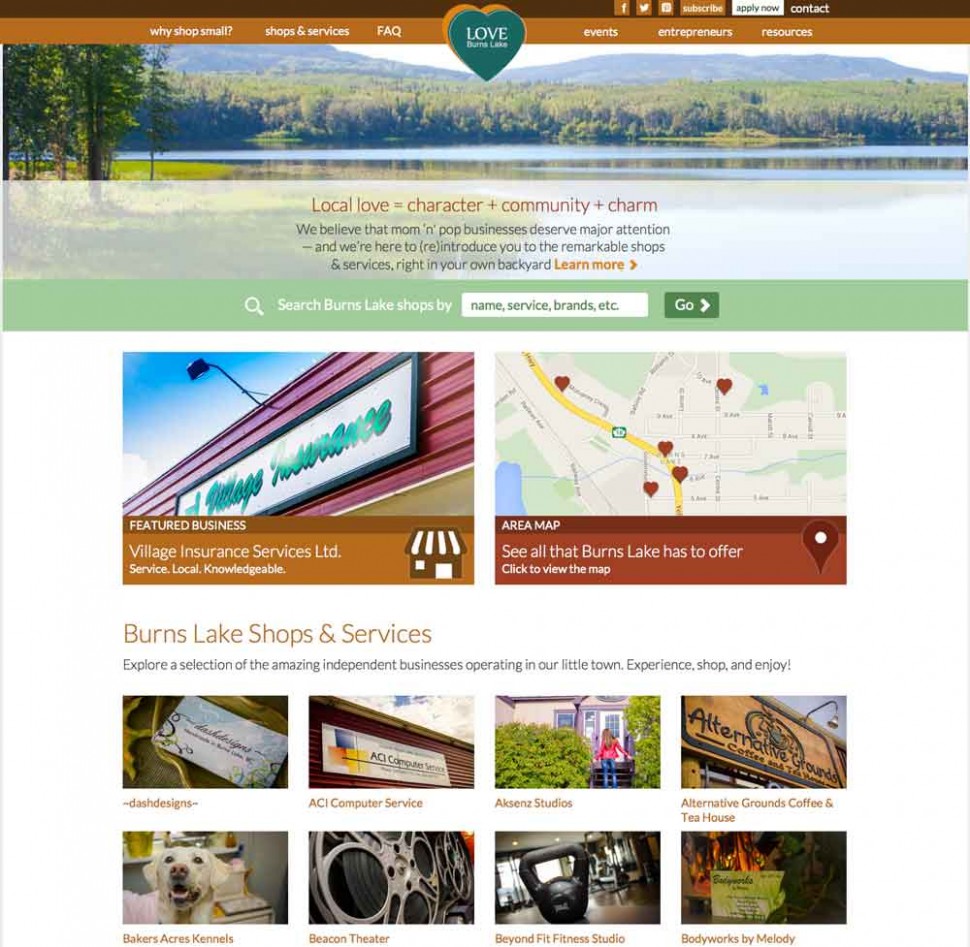
Photo Credit: Small Town Love
Small Town Love: Rekindling the romance with our local businesses
Ever been to Yarn and Sew On? It’s a speciality store in Burns Lake for knitters, embroiderers and quilters. How about Smithers-based Butter and Cream Cakery, where the baked goods are homemade and hand-decorated? Did you know there is a tonewood supplier in Valemount? Mountain Voice Soundwoods sells special cuts of Englemann spruce for the production of musical instruments.
Small Town Love showcases these businesses and many more through a series of community websites all created under its umbrella. At LoveVanderhoof.com you’ll find a day spa, a winemaking supplier and a honey producer. Love Houston’s listings include a nursery, a wilderness-fishing guide and a tea gallery boasting 77 varieties of tea.
Small-town residents are often unaware of the range of independent businesses operating in their communities and Small Town Love founder Amy Quarry hopes to change that. Her initiative, described as, “Heart-centred marketing for real human beings,” is all about helping local entrepreneurs get the attention they deserve.
The spark
“Through my business I was meeting a lot of really interesting business owners with compelling stories,” explains Quarry, who runs a marketing company in Quesnel. In 2011, she created the very first Small Town Love guide, a book featuring 50 Quesnel-based independent businesses, complete with profiles, Q-and-As and coupons. The book was so successful that one in five Quesnel residents now owns a copy of the first edition, and a website was launched to support the guide.
The buzz caught the attention of Northern Development Initiative Trust who, in 2013, partnered with Quarry on a pilot project involving six communities with populations under 5,000. A year later, with Northern Development’s continued support, twelve BC communities have fully-launched Small Town Love websites and there are almost 1,000 independent business owners participating in the program.
“The storytelling is what makes it most appealing,” explains Renata King, Northern Development’s director of business development. “It’s as much about the stories of the entrepreneurs as it is about their businesses.”
One small-business owner listed on the Love Fraser Lake site is a craftsman and avid hunter who makes high-quality longbows. “If he’s not in his workshop building his next project, you’ll likely find him somewhere in the woods,” his profile reads. Establishing a more personal connection encourages residents to support local businesses, and the profiles’ high-quality presentation on the portals, which include professional copy and imagery, is extremely valuable to businesses that might otherwise struggle to afford marketing.
At the Love Telkwa site, one entrepreneur has developed a line of soaps to raise awareness for the rare spirit bear. The connections small businesses have to local charities feature prominently in many profiles, and this was an important aspect for Quarry, who understands that many entrepreneurs make valuable contributions to causes in their communities.
Business sense
Economic development in small, often-isolated northern communities can be challenging. A common tale is of young people leaving for bigger centres because of a lack of opportunities at home. Instead of waiting for a big investor to sweep in and start hiring, it’s important to recognize the value of independent businesses in job creation, King says. “It’s much easier to help all of these small businesses create one new job versus chasing an industry to bring 50 new jobs to town.”
Many argue that it costs them more to shop locally, and this program also hopes to put those perceptions to the test. Quarry claims that products available at independent shops are often no more expensive than they would be online or at big box stores. Looking at the diverse range of products offered by the businesses already signed up to Small Town Love, it is clear that there is more choice available in small towns than many people realize. “A really common reaction that we’ve heard is, ‘I didn’t know we had all these great businesses here,’” Quarry says.
While the program is designed to encourage people to support independent businesses in their own communities, it also attracts regional visitors, with the Small Town Love sites a useful resource for them. From microbreweries with unusual ales to specialist bike shops with advice on the best local trails, every community has something interesting.
Several guesthouses are among the 85 businesses that signed up for Love Haida Gwaii. Quarry says the personal touch added to the business profiles works well for independently owned accommodations such as B&Bs, and it is a piece that is missing from many hotel-booking sites.
Small Town Love has been well received by business owners, council members and residents in participating communities, with many keen to support a program that bolsters home-grown enterprises. “To succeed, we need to have strong, locally owned independent businesses, and this project will help them prosper,” Vanderhoof mayor Gerry Thiessen said in a news release.
During the pilot project, the number of businesses registering for the program far exceeded expectations, with one particularly surprising outcome: The communities with the smallest populations have often shown an outstanding level of support in terms of businesses signed up and website visitors. Ten percent of Valemount’s population attended its Small Town Love launch party. “That speaks to people’s sense of connection to it,” Quarry says.
New portals for several northern BC communities will be available in October and November (including Haida Gwaii, Fort Nelson, McBride and Williams Lake), and launch party events will be hosted to raise project awareness in those communities. Plans are in the works to introduce more small towns to the program in 2015.
Small town Prince George?
For Quarry, the principle behind Small Town Love is “more a mind-set rather than a population statistic.” Quesnel, where the project began, is technically a small city. Quarry notes that competition from big box stores in larger centres can make it even harder for independently owned businesses to compete and, in this sense, there is a place for the concept in larger cities like Prince George.
As the initiative develops, Quarry and King are exploring new ways to market and support independent businesses. With a long-term commitment from both parties, it will be interesting to see how the program continues to grow.
“At our heart, I think our communities are strong,” Quarry says. “I think our people do care about each other and I think that they’re all working really hard to build our small towns and I’m really encouraged by that.”











